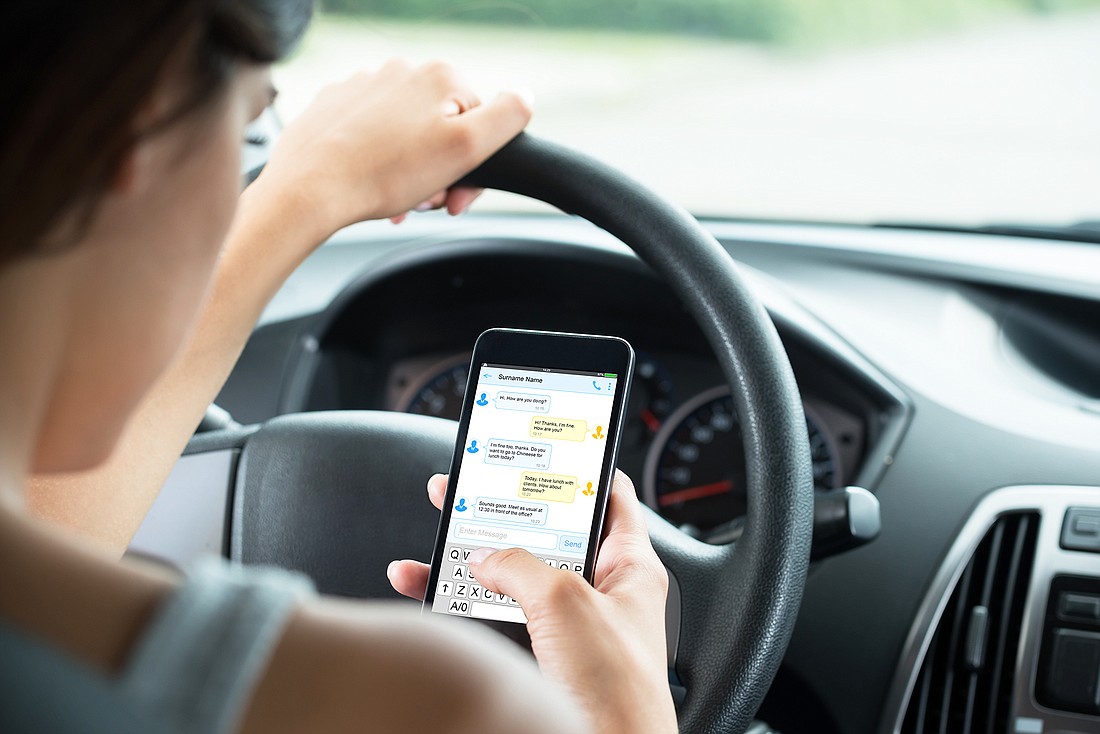
Brian Coughlin • JBA Board of Governors
Earlier this year, Florida lawmakers passed a bill (HB 107) that strengthened the state’s ban on texting while driving, but a new proposal would go even further.
State Rep. Emily Slosberg, D-Boca Raton, and a co-sponsor on HB 107, filed a bill for the 2020 legislative session (HB 249) that would make it illegal for people to operate vehicles while “manually holding or otherwise touching a wireless communications device.”
Twenty states and the District of Columbia already have such bans on handheld cell phones while driving.
Until HB 107 went into effect in July, Florida was among only a handful of states where police officers couldn’t pull motorists over for texting.
It’s been illegal in Florida for years, but was considered a secondary offense, meaning officers could cite drivers for texting only if they were pulled over for another violation.
This year, Florida became the 44th state where texting is a primary traffic offense, allowing police to pull over drivers for texting alone. In October, another provision of the new law went into effect. It requires motorists to go completely “hands-free” on wireless devices while driving in school and work zones.
However, outside of those areas, drivers can have their phones in hand for a variety of reasons, including talking, using navigation and checking safety-related traffic or weather alerts. Drivers also may use cellphones while a car is stationary, like while stopped at a red light.
This has raised concerns about the enforceability of the law, part of the reason Slosberg is pushing to expand restrictions to any time an individual is behind the wheel.
Indeed, legislation to completely ban the use of handheld phones while driving was raised in Massachusetts this year for the same reason. Massachusetts police officers complained the previous ban on texting, similar to Florida’s HB 107, was too difficult to enforce, as officers cannot always distinguish whether a driver is using a phone to text or for some other purpose.
Both the Massachusetts House and Senate passed versions of the distracted driving bill by near-unanimous margins this spring. However, the legislation has been stalled for months over how to address concerns that police would use the new law as a way to racially profile minorities.
Florida’s recent texting while driving ban faced similar civil rights concerns, given evidence such as a 2016 study by the American Civil Liberties Union, which found that black drivers in Florida were nearly twice as likely to be stopped for not wearing a seat belt as white drivers.
The law was ultimately passed with two important civil rights components.
First, police are required to report the races of those cited, so officials can see whether the new law is being applied unevenly. This is the first such Florida traffic law where race must be reported. However, if a suspect is stopped for texting and not cited, but charged with another crime, his or her race would not be reported.
Second, police are required to tell drivers they have the right to decline a search of their phones. The one exception to this rule is if a crash results in death or injury. If that happens, a motorist’s billing records for their cellphone will be considered admissible evidence.
In the meantime, Florida Highway Patrol troopers will be issuing warnings for the state’s current texting while driving law until Dec. 31, and tickets will start to be issued Jan. 1.
The penalty is a nonmoving traffic violation with no points on the record and a $30 fine. In a school or work zone, it is a moving violation with three points on the driving record and a $60 fine.
Brian Coughlin is a partner at the Bedell Firm. His practice focuses on matters of criminal justice.